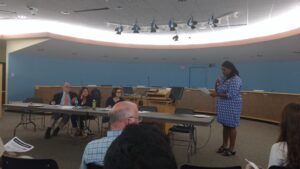 The Minnesota House Select Committee on Affordable Child Care held a hearing on July 19 at the Minneapolis Parks and Recreation Board office to hear from the community on child care related issues. Committee chair Rep Mary Franson, R-Alexandria, was joined by other house members Rep Joe Mullery, DFL-Minneapolis, Rep John Persell, DFL-Bemidji, and Rep Peggy Flanagan, DFL-St. Louis Park. Many people shared their stories and concerns from the field at the meeting.
The Minnesota House Select Committee on Affordable Child Care held a hearing on July 19 at the Minneapolis Parks and Recreation Board office to hear from the community on child care related issues. Committee chair Rep Mary Franson, R-Alexandria, was joined by other house members Rep Joe Mullery, DFL-Minneapolis, Rep John Persell, DFL-Bemidji, and Rep Peggy Flanagan, DFL-St. Louis Park. Many people shared their stories and concerns from the field at the meeting.
A main focus of potential improvement for attendees of the committee hearing was the Child Care Assistance Program (CCAP). Clare Sanford, Director of Government and Community Relations for New Horizon Academy, stated that CCAP is “hard to get, hard to use, and hard to keep.” Several other testifiers reinforced this idea. They spoke about families losing CCAP for various reasons, including moving counties, earning raises at work, or filling out paperwork incorrectly. This abrupt change to their child care situation often causes family instability, which can be especially harmful for young children’s development. Some testifiers mentioned that because of the way benefits are structured, it often feels more like they are being held down rather than being helped up.
Several attendees asked legislators to raise the CCAP reimbursement rate for child care providers. There were also calls to fully fund the CCAP waitlist so that all families who need it can access the program. Currently there are over 7,000 children on the waitlist statewide, approximately 60% of whom are children of color.
Many child care providers from both centers and family child care expressed concern about inconsistencies. County licensors approach their duties differently, with some issuing fines and others simply offering warnings for violations. A few family child care providers noted that this inconsistency adds a lot of stress to their jobs because they are worried about a large fine or harmful citation even as they try very hard to follow all of the rules.
Elders for Infants emphasized the importance of consistent, high-quality care for babies and toddlers. Secure attachment is crucial at that stage of development, and staff turnover is very detrimental. They advocated for minimizing stress for both children and caregivers.
Universal Public School Pre-K was a concern for several private and non-profit providers. They pointed out that the schools do not have the space to provide the programming and thus cannot do it alone.
As a result of the Select Committee on Affordable Child Care’s recommendations, a start-up manual for child care providers interested in opening a business will be produced, and grant money for starting child care in Greater Minnesota was allotted. The 2016 legislature also established a task force. The Child Care Task Force will look into streamlining paperwork, ensuring consistency across (and within) counties, and providing other supports for child care providers. Members of the task force have not yet been named. They will have to submit a report to the legislature by January 15, 2017.








